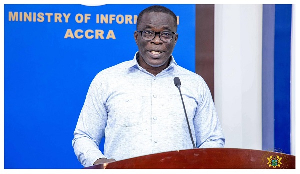Government has come under criticism again over the delay and what some have described as government’s non-committal attitude towards the passage of the Right to Information Bill.
Despite government’s explanations that certain structures must first be put in place to ensure smooth implementation and accessing of information when the law is passed, critics say it has taken too long since the first draft was put together eight years ago.
At a two-day Africa Regional Conference on Freedom of Information in Accra, some participants in their contribution did not hide their suspicion of government unwillingness to act on the bill. Others also questioned the government’s sincerity as it continues to promise that it will be moving the process forward.
Participants called on African governments including Ghana to show enough commitment towards the passage of the bill, emphasizing that it enhances the democratic credentials of individual member countries.
Florence Nakazibwe, a Project Officer in the Accra office of the Commonwealth Human Rights Initiative (CHRI) told the dailyEXPRESS that information legislation is an incentive and a tool for the enhancement of democratic culture.
Nakazibwe argued that government cannot claim to be championing the rule of law and human rights when people “cannot fully express themselves if they don’t have the right information, and also the right of the public to exercise their scrutiny over government.”
She said the bill will help in empowering “the public to monitor and also to participate effectively in their own governance.”
The real reasons for government’s growing apprehension about the FoI bill is still not known, but former Information Minister Kwamena Bartels is on record to have cited among others national security concerns. He also argued that the structures that will aid implementation of the law are not in place.
These reasons have however been rejected by some journalists and pro-FoI campaigners who also question why government is afraid of opening itself for public scrutiny.
Ms. Nakazibwe however says government has nothing to fear because “this is a provision that will save resources because of the adverse consequences of corruption… because many of the public’s resources are lost because public officials can get away with their actions and that is also because the present dispensation makes it easier for them to escape accountability.”
Another identifiable fear that government entertains, according to Florence Nakazibwe, is the purported cost involved in the project, especially when it cost the U.K. government almost twenty five million pounds (£25m).
But again, Ms. Nakazibwe told the dailyEXPRESS that such fear is misplaced because the implementation structures in the United Kingdom are completely different from what pertains here in Ghana or anywhere on the continent.
Uganda is one of three African countries apart from South Africa and Angola and until recently Zimbabwe, who have existing laws on the public access to information.
Patrick Tumwine is with the Uganda based Human Rights Network and he says accessing information is one of the major ways to enhance public participation aimed at promoting public accountability. He adds that it also goes a long way to rid society of corruption through the promotion of whistle blowing.
Tumwine however noted that “this right is subject to the condition that it should not prejudice the security and sovereignty of the state or interfere with another person’s right to privacy.
Mr. Tumwine also underpinned some challenges inherent in the law which according to him “is merely a stepping stone that will need further amendments, incorporations, and favourable political will for both its actual implementation and full realization.”
According to him, the Act is silent on the time limit for its effective implementation, as well as demanding too much information from seekers especially in as far as it demands for the personal details of the person seeking information.
President Kufour is on record to have said that the his government is working hard to ensure that the bill is passed into law, but would still have to work on the fine details in order to avoid any associated problems.
At the 5th dailyEXPRESS’ Breakfast Series in Accra recently, the Executive Secretary of the National Media Commission George Sarpong and the Editor in Chief of the Statesman newspaper Gabby Otchere Darko criticized government for its lack of political will in passing the bill into law.
In his contribution, Mr. Otchere Darko said “it was a very spurious attempt for the government to say that because of national security considerations we are shaky about bringing the right to information bill into place because really we tend to confuse stories that will embarrass government, stories that will expose government, wrong doings of government with that of national security.”
Mr. Sarpong on his part asked government rhetorically if the structures were in place before the Representation of the People Amendment Law (ROPAL) was passed.
General News of Monday, 6 August 2007
Source: dailyexpress newspaper (editor@dailyexpressonline.com)
















